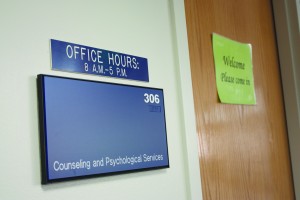CAPS in the red
by: Manda Perkins
Assistant news editor
For the first time since opening its doors, Counseling and Psychological Services is experiencing financial difficulty.
“The cost to maintain the office has become increasingly overbearing,” said CAPS Director David Bush. “Several factors come into play; providing insurance benefits to all employees as mandated by the Affordable Care Act, the cost of accreditation and a change in phone service are several of the reasons the office has found it increasingly hard to balance the books.”
According to the office’s financial summary, CAPS operated with a $769,073.05 budget last fiscal year, which was used to pay the salaries of eight licensed psychologists and support staff, fund scholarships for graduate students and provide free services and several other functions.
“That’s just inadequate funding for the number of people who work here to try to do all the programs we do for students,” Bush said.
Bush said CAPS is usually able to break even, but the financial stress of hosting two accreditation professionals last year was enough to put them in the red. Bush said without the additional help of tier two funding, he will have to consider losing a graduate student position.
“Not only is the job really relevant to their career, it allows them to serve other students,” he said. “Our graduate students are with us 20 hours a week so if we lost one of them, it would be a real blow to our program.”
But he won’t be letting go of the doctoral associateship position without a fight; it’s too valuable to the CAPS office and to the students of the university.
“That’s one of my goals this year as director, is to have a way to pay for the additional cost of insurance and not lose our training slots because we love having students here and we want to take advantage of these training opportunities,” he said.
Bush doesn’t blame the university for the financial struggle; other offices on campus are also experiencing the stress of funds stretched too thin. He said James Morales, vice president of Student Services, has been very supportive in helping produce more funding.
“There’s no question that the services, programs and support CAPS provides for students are critically important, so we do make every effort to ensure it is funded as best as we can,” Morales said. “We’re looking at multiple ways to do that.”
“We need to sit down with our financial liaison and come up with a more realistic budget,” Bush said. “It’s just a matter of trying to find a funding source.”
A possible source could be through Regional Campuses and Distance Education. Bush said a plan is in the works to make CAPS services more accessible to students living away from Logan’s main campus. This means piloting online training courses, versus the traditional face-to-face sessions.
“There’s some fun and experimental things we’re doing, making use of computer technology, to serve a broader number of students this year,” he said.
Bush estimates CAPS serves over 1,000 students a year through workshops, individual counseling, group counseling or couples counseling. By October of a new school year the office sees heavy traffic, but still manages to help participating students. All services are free to students taking six or more credits at Utah State University.
It’s important for students to be healthy emotionally if they are to succeed academically, Bush said.
“The reason we even exist is to make sure that the social and emotional part of a student’s experience adds to their academic success. If a student is coping with severe emotional challenges, whether it’s depression, anxiety…then they’re not going to perform as well in the classroom,” he said. “Our mission is to do everything possible to be sure every part of a student’s experience in and out the classroom will make them successful in life.”
For the past five years, CAPS has received an average of 95-96 percent approval rating from students, stating they either agree or strongly agree their services have been helpful. Although money is tight, Bush is confident in the services the office provides to help students achieve a healthier state of mind.
“I can’t imagine a campus where we have a better group of students to work with,” he said. “I love the atmosphere on campus and in our office. Even though there are challenges, I think, relatively speaking, we have a great operation.”
Twitter: @perkins_manda


